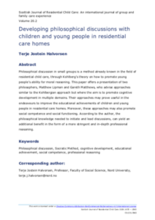Since the 1980s, an increasing number of researchers have focused on the educational attainment of looked-after children. Children in residential homes are in high risk of educational failure, and such failure may cause social problems later in life. Several scholars have called for efforts to promote lookedafter children’s ability to cope with academic challenges. According to Francis, residential care professionals should ‘Develop a learning culture’, ‘identify and support the child’s interests and talents’, and ‘look beyond the school for learning opportunities’. Philosophical inquiry as proposed by Lipman and Matthews meets these claims and may be part of the effort Francis calls for.
Another issue that has attracted increased attention in the field of residential care and adjacent fields is how poor reasoning skills might get children and young people into problems in social interaction. This new focus can be traced to changes in professional theories. Both psychoanalysis and behaviourism have undergone a ‘cognitive turn’. In the former, Fonagy and colleagues (2004) have described the importance of mentalisation, that is the capacity to interpret human reactions as manifestations of mental entities. This meta-cognitive capacity is a prerequisite for affect regulation and for the ability to adapt to the needs of others. In the behaviourist tradition, several scholars have described how clients can learn to identify self-instructions and self-evaluations that promote and maintain problem behaviour and replace these with thoughts that bring alternative behaviour. Also Kohlberg (1984), who has logical constructivism (compare Piaget, 1953) as his starting point, has put reasoning skills on the agenda in social pedagogy. His approach where young people are invited to discuss dilemma situations is included in ART, Aggression Replacement Training. Since the late 1990s, residential care professionals in many countries have attended training programmes to qualify as ART-educators. Also philosophical inquiry as proposed by Lipman and Matthews may have a positive impact on social function. Their approaches can promote social competence in form of an ability to articulate problems and give reasons and a habit of actively listening to others and exploring disagreements reasonably.

